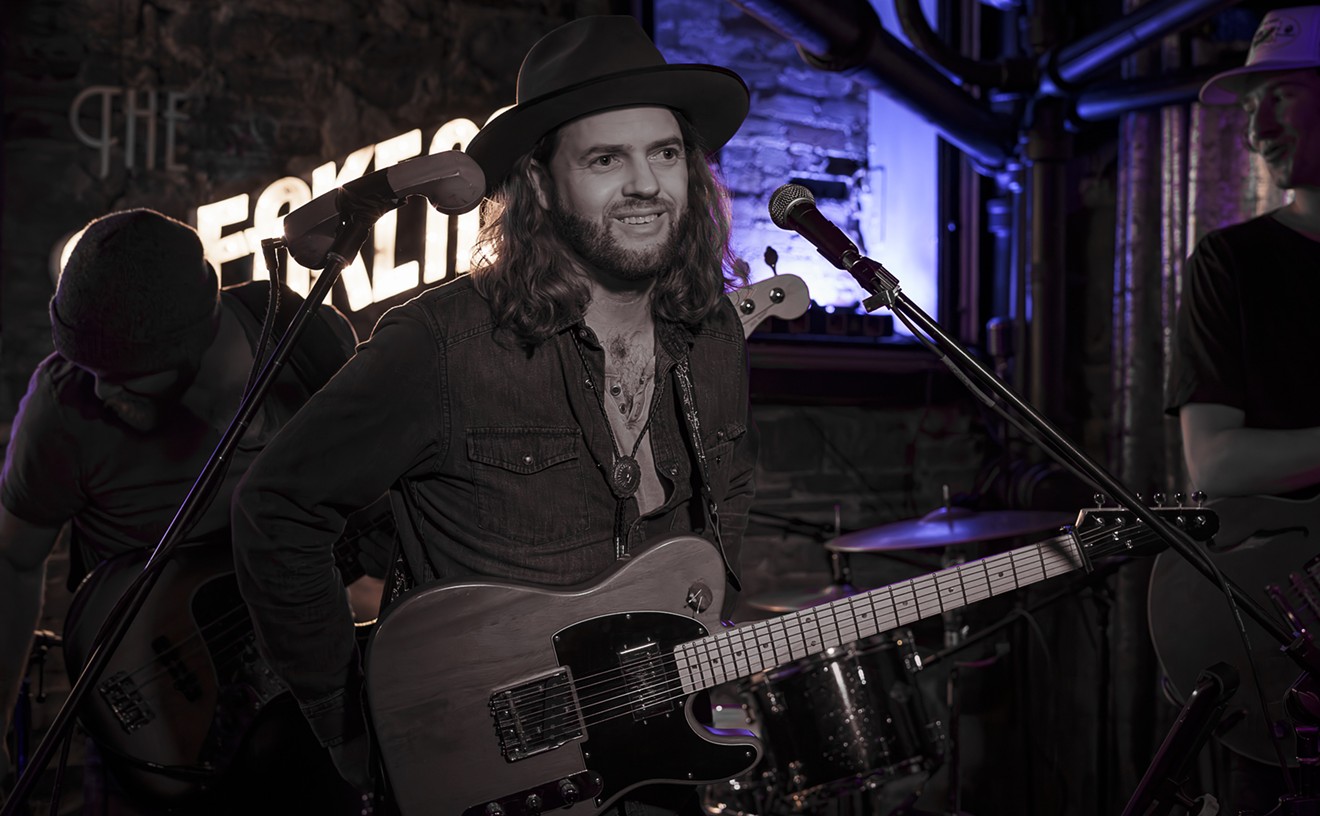When Richard Reinhardt auditioned to become a member of the Ramones in 1983, few knew what an asset he would be to the legendary punk outfit. Not only could Richie Ramone play the hell out of the drums, he could also sing and write songs. With Richie aboard, The Ramones produced three of their best albums: Too Tough to Die, Halfway to Sanity and Animal Boy.
See also: Richie Ramone at Herman's Hideaway, 3/3/14
A dispute over merchandise revenue led to Richie walking away in 1987, but he had left his mark on a quintessential American rock band. His songs, such as "Somebody Put Something in My Drink" have been covered by several punk and metal bands. In advance of his Monday, March 3, show at Herman's Hideaway, we recently spoke with Richie about keeping the true meaning of the Ramones alive.
Westword: You are originally from New Jersey. How long have you been in Los Angeles?
Richie Ramone (aka Richard Reinhardt): I've lived here three different times. I moved here in 1988, and then I moved back to New York, and then I came back in 2000. I then moved to Miami, and now I am back in L.A. for four years. I am here for good. It's either New York or L.A. for me, especially for this business. But now, I don't have to deal with the snow. You can't have a house in New York City. You can't have a car.
Your debut solo album that came out last year, Entitled, has gotten some great reviews.
It's very exciting. It is a really positive record. It's cool and it sound great. The songwriting is strong. It is a unique sound. It separates itself from a lot of stuff that is out there. It's because of my weird vocals.
You can hear that classic Ramones sound shining through.
There is a Ramones influence, but it is just a hard rock record. That sound is in my blood, that in your face sound. I have two guitar players who are both very good. I have a drummer, so when we play live, I get to move to the front and sing. It gets a little weird sitting behind the drums and singing. The kids like me to come up front so they can steal my jewelry. I wanted to combine those different sounds of punk and metal, and that is what I got, punk meets a little metal, and I am happy with the outcome. I think the record is a little heavier and a little darker than the Ramones. I don't write happy songs. The stuff I wrote for the Ramones is kind of dark. "Someone Put Something in My Drink" is not a happy, surf song.
Why did you decide to record the album in Nashville?
The bass player I was using at the time knew the studio. We got a great rate, and the engineer there I really liked. We went to Nashville for ten days. I brought the tapes back to L.A. and mixed them for seven months. It's great to go record somewhere else because you don't have your friends coming down to the studio to hang out. It's nice to get out of town with the guys and lay it down. It's hard to tell people not to come down. I don't like having the posse around. It's too intense. Because I also produced this record, I had to be on both sides of the glass. I had to have it the way I wanted. When the posse is there, it is a little too much.
Did you make it to the Grand Ole Opry?
Yes, but we had been there before. I saw that and some other places, but it was mostly work for sixteen hours a day, catch some sleep and back to work in the morning. When you are in the studio, you have to take advantage of the time. There is no time to goof around.
Do you feel obligated to do Ramones material when you play?
I try to stay away from it until the end. I need to play three or four of Ramones' classics. That is mostly for the encore. It is definitely not a Ramones tribute thing. We play about twenty songs in the set, and I choose two or three Ramones songs to play. I even play some b-sides. There was an album done while Joey was in the hospital. I got to sing lead on a few songs. I will do those because people know them. I do a few Ramones songs to make everybody happy. I am not about doing what C.J. and Marky do. They do a whole set of Ramones song. I am not going to do that. It is not the same without Joey and Dee Dee, not the same without everybody there. I don't feel I need to do that.
You've written a suite for drums and orchestra. Being an accomplished musician, was it odd to play as basically as you had to when you joined the Ramones in 1983?
No, not at all. If you watched the shows after I joined, the loudest thing was the drums. The drums were the heartbeat. I had to lay down that beat faster and faster. That's just the way it went. It didn't bother me musically. One time, I wrote one song with a minor chord, and Johnny got upset. That was the song "Human Kind." Rock and roll, to me, means you can't be going hog wild all over the place. I wrote the symphony stuff to show another side. I could get all my jollies off with that kind of music. That's where you are really drumming and soloing. Rock and roll is your two/four, and you hold it down. I come from a back ground where fewer drums are more. It is more of an art form.
In 1983, what were the circumstances that led to you becoming a Ramone?
They knew nothing about me. I was hanging around those guys in New York. One day, I ran into a Ramone roady, and he told me that the band was auditioning drummers. I put my name in the hat, and the road manager called me a week later. It was a regular audition like you would have with any band.
Why did you decide to leave the band?
It was about merchandise and stuff like that. I wasn't getting a cut of that. That was probably the main reason. I was a kid then. I had been with the band five years, and I wanted to get cut in. Johnny wouldn't allow it. It is a simple story. I left.
The albums the band made when you were a member are thought of as the most mature and best sounding Ramones albums.
Are they? Who said that? A drummer can influence the sound of a band. A band that has three different drummers can sound three different ways. My drumming is way more aggressive. When Too Tough to Die came out, that album got back to the raw roots of it all. Before that, the Ramones' albums were kind of wishy-washy and soft. We got it back to in-your-face type of songs.
Children of Bodom do a metal version of "Somebody Put Something in My Drink." Are your songs easily adaptable for other genres?
Yes, a lot of metal bands have covered my songs. I think Children of Bodom have done four different versions of that song. These bands are much more hardcore than the Ramones. I like that these bands pick up on that heaviness.
Do you ever have contact with the other surviving Ramones?
It's funny because it's the opposite of Spinal Tap because all of the drummers are still alive. I see Tommy when I am in New York. I've never spoken to Marky, not one word. You can leave it at that.
There have been several Ramones' documentaries. Have you taken part in those?
No, not really. I did one documentary where I finally spoke. I stayed out of all the negativity. I didn't want to get involved with the bashing. They were all upset when I just walked. But things have come full circle. People understand I am at, and this album is going to be huge. It's my first record.
• BACKBEAT'S GREATEST HITS • - The fifty best rap lyrics of all time - The ten biggest concert buzzkills - Five more concert buzzkills - From Phish to Floyd, the ten best light shows
Follow @Westword_Music










